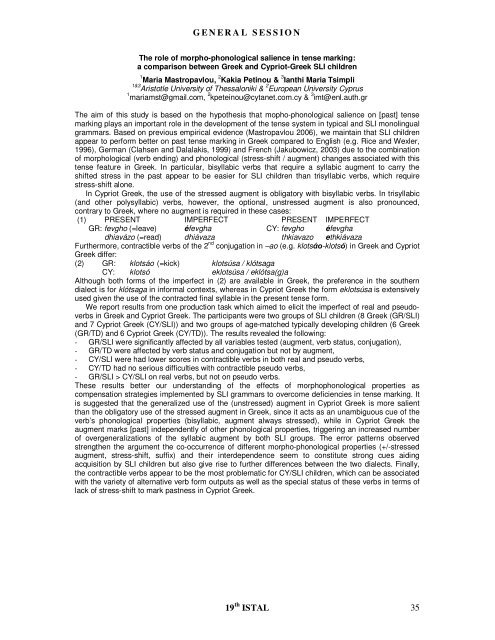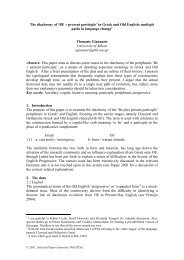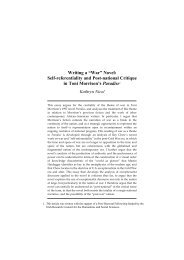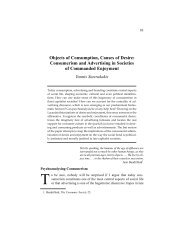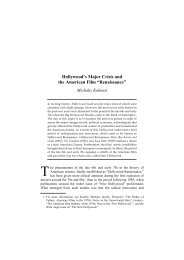19 International Symposium on Theoretical and Applied Linguistics ...
19 International Symposium on Theoretical and Applied Linguistics ...
19 International Symposium on Theoretical and Applied Linguistics ...
Create successful ePaper yourself
Turn your PDF publications into a flip-book with our unique Google optimized e-Paper software.
G E N E R A L S E S S I O N<br />
The role of morpho-ph<strong>on</strong>ological salience in tense marking:<br />
a comparis<strong>on</strong> between Greek <strong>and</strong> Cypriot-Greek SLI children<br />
1 Maria Mastropavlou, 2 Kakia Petinou & 3 Ianthi Maria Tsimpli<br />
1&3 Aristotle University of Thessal<strong>on</strong>iki & 2 European University Cyprus<br />
1 mariamst@gmail.com, 2 kpeteinou@cytanet.com.cy & 3 imt@enl.auth.gr<br />
The aim of this study is based <strong>on</strong> the hypothesis that mopho-ph<strong>on</strong>ological salience <strong>on</strong> [past] tense<br />
marking plays an important role in the development of the tense system in typical <strong>and</strong> SLI m<strong>on</strong>olingual<br />
grammars. Based <strong>on</strong> previous empirical evidence (Mastropavlou 2006), we maintain that SLI children<br />
appear to perform better <strong>on</strong> past tense marking in Greek compared to English (e.g. Rice <strong>and</strong> Wexler,<br />
<str<strong>on</strong>g>19</str<strong>on</strong>g>96), German (Clahsen <strong>and</strong> Dalalakis, <str<strong>on</strong>g>19</str<strong>on</strong>g>99) <strong>and</strong> French (Jakubowicz, 2003) due to the combinati<strong>on</strong><br />
of morphological (verb ending) <strong>and</strong> ph<strong>on</strong>ological (stress-shift / augment) changes associated with this<br />
tense feature in Greek. In particular, bisyllabic verbs that require a syllabic augment to carry the<br />
shifted stress in the past appear to be easier for SLI children than trisyllabic verbs, which require<br />
stress-shift al<strong>on</strong>e.<br />
In Cypriot Greek, the use of the stressed augment is obligatory with bisyllabic verbs. In trisyllabic<br />
(<strong>and</strong> other polysyllabic) verbs, however, the opti<strong>on</strong>al, unstressed augment is also pr<strong>on</strong>ounced,<br />
c<strong>on</strong>trary to Greek, where no augment is required in these cases:<br />
(1) PRESENT IMPERFECT PRESENT IMPERFECT<br />
GR: fevgho (=leave) éfevgha CY: fevgho éfevgha<br />
dhiavázo (=read) dhiávaza thkiavazo ethkiávaza<br />
Furthermore, c<strong>on</strong>tractible verbs of the 2 nd c<strong>on</strong>jugati<strong>on</strong> in –ao (e.g. klotsάο-klotsό) in Greek <strong>and</strong> Cypriot<br />
Greek differ:<br />
(2) GR: klotsáo (=kick) klotsúsa / klótsaga<br />
CY: klotsó eklotsúsa / eklótsa(g)a<br />
Although both forms of the imperfect in (2) are available in Greek, the preference in the southern<br />
dialect is for klótsaga in informal c<strong>on</strong>texts, whereas in Cypriot Greek the form eklotsúsa is extensively<br />
used given the use of the c<strong>on</strong>tracted final syllable in the present tense form.<br />
We report results from <strong>on</strong>e producti<strong>on</strong> task which aimed to elicit the imperfect of real <strong>and</strong> pseudoverbs<br />
in Greek <strong>and</strong> Cypriot Greek. The participants were two groups of SLI children (8 Greek (GR/SLI)<br />
<strong>and</strong> 7 Cypriot Greek (CY/SLI)) <strong>and</strong> two groups of age-matched typically developing children (6 Greek<br />
(GR/TD) <strong>and</strong> 6 Cypriot Greek (CY/TD)). The results revealed the following:<br />
- GR/SLI were significantly affected by all variables tested (augment, verb status, c<strong>on</strong>jugati<strong>on</strong>),<br />
- GR/TD were affected by verb status <strong>and</strong> c<strong>on</strong>jugati<strong>on</strong> but not by augment,<br />
- CY/SLI were had lower scores in c<strong>on</strong>tractible verbs in both real <strong>and</strong> pseudo verbs,<br />
- CY/TD had no serious difficulties with c<strong>on</strong>tractible pseudo verbs,<br />
- GR/SLI > CY/SLI <strong>on</strong> real verbs, but not <strong>on</strong> pseudo verbs.<br />
These results better our underst<strong>and</strong>ing of the effects of morphoph<strong>on</strong>ological properties as<br />
compensati<strong>on</strong> strategies implemented by SLI grammars to overcome deficiencies in tense marking. It<br />
is suggested that the generalized use of the (unstressed) augment in Cypriot Greek is more salient<br />
than the obligatory use of the stressed augment in Greek, since it acts as an unambiguous cue of the<br />
verb’s ph<strong>on</strong>ological properties (bisyllabic, augment always stressed), while in Cypriot Greek the<br />
augment marks [past] independently of other ph<strong>on</strong>ological properties, triggering an increased number<br />
of overgeneralizati<strong>on</strong>s of the syllabic augment by both SLI groups. The error patterns observed<br />
strengthen the argument the co-occurrence of different morpho-ph<strong>on</strong>ological properties (+/-stressed<br />
augment, stress-shift, suffix) <strong>and</strong> their interdependence seem to c<strong>on</strong>stitute str<strong>on</strong>g cues aiding<br />
acquisiti<strong>on</strong> by SLI children but also give rise to further differences between the two dialects. Finally,<br />
the c<strong>on</strong>tractible verbs appear to be the most problematic for CY/SLI children, which can be associated<br />
with the variety of alternative verb form outputs as well as the special status of these verbs in terms of<br />
lack of stress-shift to mark pastness in Cypriot Greek.<br />
<str<strong>on</strong>g>19</str<strong>on</strong>g> th ISTAL 35


